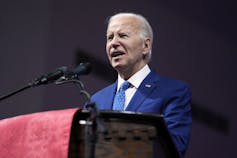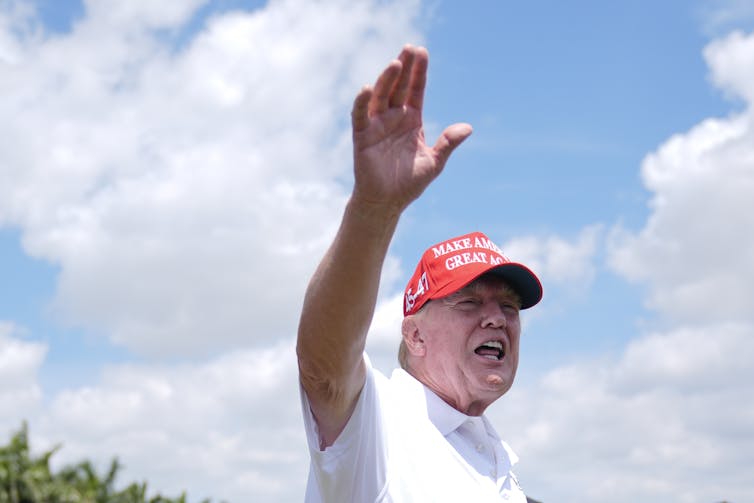President Joe Biden and Republican presidential candidate Donald Trump participate in a presidential debate on June 27, 2024, in Atlanta. Biden’s been faced with growing calls to exit the race ever since. (AP Photo/Gerald Herbert)
by James K. Rowe, University of Victoria
Given the Democratic Party’s belief that Donald Trump is a threat to democracy, it’s not surprising some are questioning why a faltering U.S President Joe Biden is still their nominee when the stakes are so high.
It is startling to watch clips of Biden debating Trump in 2020.
He’d already lost some steam compared to earlier debate performances during his 50-year political career, but he was still a formidable verbal jouster. But the American president’s recent CNN debate with Trump was not just a bad performance, it appears to provide the smoking-gun proof his advisers have reportedly tried to hide from the public: He is no longer up for one of the most demanding jobs in the world.
At this point, for Joe Biden to insist on defying biology, to think that a decent performance at one rally or speech can offset the indelible images of last Thursday’s debate, is folly. David Remnick makes the case that Biden should step aside. https://t.co/rbnTSTfMcV
— The New Yorker (@NewYorker) July 6, 2024
Aging at different rates
Not everyone ages at the same rate — compare Biden to Sen. Bernie Sanders and Nancy Pelosi, former Democratic House of Representatives speaker. Both are older than him yet remain sharp.
There’s also no doubt elderly people who struggle to find their words and memories still have a tremendous amount to give and should be honoured for their accumulated wisdom. But maybe they shouldn’t hold down a grinding job that appears to quicken the aging process even for those much younger than Biden.

U.S. President Joe Biden speaks at a recent church service in Philadelphia. (AP Photo/Manuel Balce)
The stakes are existential as Trump promises to accelerate fossil fuel production in the middle of a climate emergency while solidifying the Supreme Court majority that has stripped away federal abortion rights and the government’s capacity to regulate corporate malfeasance.
When Biden ran against Trump successfully in 2020, the selling point he made to those already concerned about his age was that he would be a bridge to the future, perhaps only serving one term. So why is Biden still clinging to power, even after broadcasting his frailty to the 50 million people who tuned in to the first debate?
‘Earthly heroism’
There isn’t a singular answer, of course. But Biden’s ego — and his unwillingness to walk away from the power that likely compensates for his own fears about inevitable decline — is undoubtedly a powerful factor.
In his Pulitzer Prize-winning book The Denial of Death, anthropologist Ernest Becker argued that we unconsciously cope with our existential fears by pursuing “earthly heroism.” We seek social recognition that offers hits of the power and control that the natural world appears to deny us by writing death into all our life contracts.
None of this is rational. But death can be terrifying, so it makes sense that we become irrational in the face of impermanence.
There is a growing body of psychological research — known as terror management theory — that offers robust experimental evidence for the link between fear of death and compensatory fantasies of supremacy that can wreak havoc both personally and politically.
Biden seems to be denying his own aging process and is seemingly clinging to power to compensate for his growing fragility, but this stubbornness could imperil our collective future. As Becker impressed upon his audiences, existential fear plays a far greater role in our individual and political lives than we’d generally like to admit.
Even in this era of polarization, death denial is bipartisan. Trump is a walking embodiment of Becker’s theories. The man is obsessed with pasting his name on everything from buildings, sneakers and steaks, seeking social power — or what Becker called “symbolic immortality” — to compensate for his unconscious anxieties.

Donald Trump-branded shoes sit on display for sale at the North Carolina GOP convention in Greensboro, N.C., in May 2024. (AP Photo/Chuck Burton)
Trump is an admitted germaphobe who is obsessed with notions of impurity and physical weakness, including hair loss, which he associates with diminished strength and vitality.
Of course, existential anxieties are not the only factors driving Trump’s hunger for supremacy and Biden’s unwillingness to pass the torch as he holds onto power. But they are major components, and they don’t get the media coverage they deserve in our largely death-denying culture.

Donald Trump waves to supporters as he walks on the driving range ahead of the final round of LIV Golf Miami at Trump National Doral Golf Club in April 2024, in Doral, Fla. (AP Photo/Rebecca Blackwell)
The dangers of death denial
In my new book Radical Mindfulness: Why Transforming Fear of Death is Politically Vital, I demonstrate how denying death only tends to bring forth more death and destruction.
In the case of Biden, his denial is bringing the world dangerously close to another Republican presidency rife with Trump’s many denials and resentments.
Biden’s debate bomb was a poignant moment as his denial and that of his team ran headfirst into reality. His campaign is closing ranks around him, asking voters to choose denial, when a path remains open to replace him.
Here’s the bottom line:
If we work together, there’s not a damn thing we can’t do. pic.twitter.com/OP6uEowsAY
— Joe Biden (@JoeBiden) July 8, 2024
There is so much complexity to political outcomes, and yet the recent debate clarifies how raw compensatory ego, rooted in death denial, remains an underappreciated force in politics.
Healthy and flourishing societies hinge on forging cultures that are more open to the reality of death so that they’re less subject to compensatory bids for power and supremacy. If Biden and his team accepted his own impermanence and generously passed the torch to the next generation, it would be a step in the right direction.
James K. Rowe, Associate Professor of Political Ecology, University of Victoria
This article is republished from The Conversation under a Creative Commons license. Read the original article.